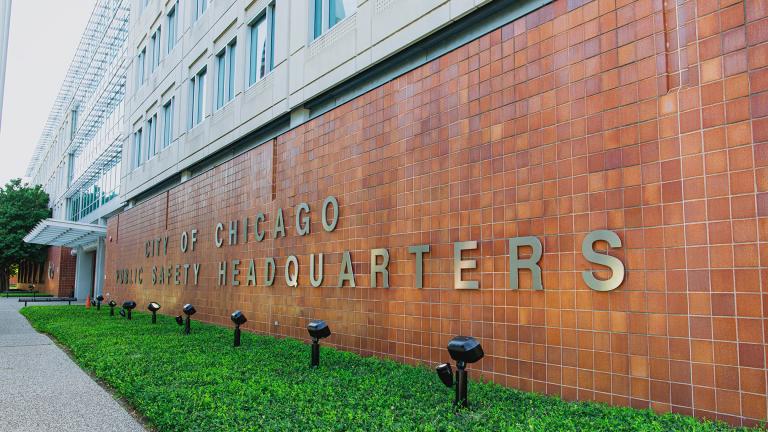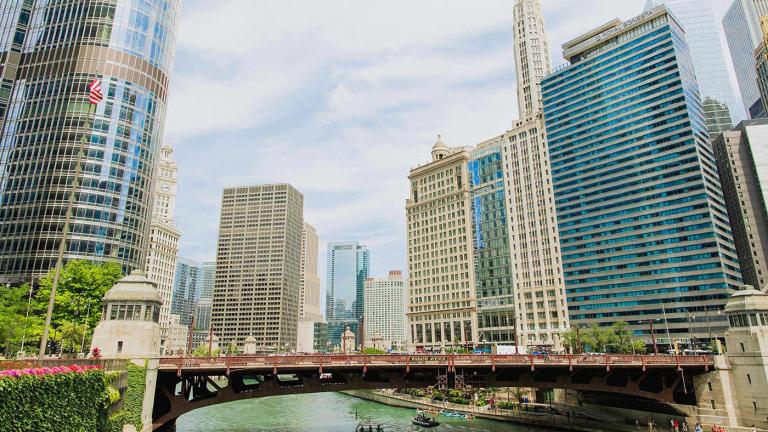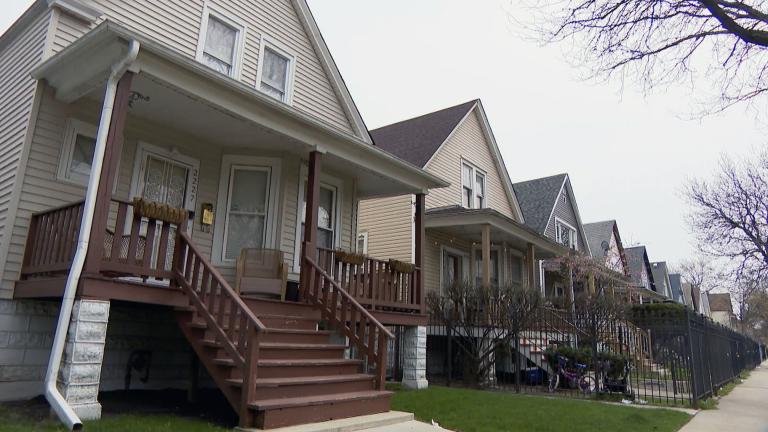Mayor Lori Lightfoot has yet to make good on promises to use nearly $2 billion in federal relief funds to strengthen the city’s tattered social safety net and provide direct aid to Chicagoans struggling to recover from the COVID-19 pandemic.
One year after the Chicago City Council approved what Lightfoot calls the Chicago Recovery Plan, city officials have spent just $130.5 million of the $1.227 billion earmarked for a host of programs including affordable housing, mental health, violence prevention, youth job programs and help for unhoused Chicagoans, according to data released as part of the mayor’s 2023 budget proposal.
The lagging progress of the mayor’s plan to help the city and its residents recover from the economic catastrophe caused by the COVID-19 pandemic is likely to complicate her effort to win a second term, which centers on claims that Lightfoot has led Chicago to the best recovery of any big city in America.
By comparison, the city spent nearly $1.1 billion in federal COVID-19 relief funds in 2021 and 2022 and will use another $152.4 million in 2023 to shore up the city’s pandemic-devastated budget. That has filled Chicago’s coffers with cash, helping the city end 2021 with a surplus of $318 million, according to the city’s annual financial report.
The city’s finances are in such good shape that Lightfoot has proposed using $242 million in unanticipated revenue to make an additional payment to the city’s four pension funds. At the same time, the mayor has no plans to significantly increase spending on the priorities laid out in the Chicago Recovery Plan, or accelerate efforts to spend those funds.
Under rules established by the federal government, Chicago officials have until 2026 to spend their nearly $1.9 billion share of the federal relief package known as the American Rescue Plan signed into law by President Joe Biden. The money must be appropriated by 2024. The Chicago City Council approved plans a year ago to supplement those funds by borrowing an additional $660 million.
As part of the release of Lightfoot’s 2023 spending plan, budget officials also released an update on the progress of the Chicago Recovery Plan, detailing a proposal to spend a total of $250 million by the end of 2022, an additional $538 million in 2023 and $260 million in 2024.
Chief Financial Officer Jennie Huang Bennett told reporters on Oct. 3 that the nonprofits the city will contract with to provide services detailed by the Chicago Recovery Plan told officials they did not want a “one-time influx of money.”
“The intention was always to have some portion of that money spent in those subsequent years so we could carry forward those programs,” Bennett said, adding that the recovery plan was intentionally designed to “effectively building real capacity over time and creating some sustainability over time.”
In August, Lightfoot told reporters that much of the past year had been spent “crafting a blueprint” to ensure the federal COVID-19 relief funds were spent appropriately and effectively.
That means the city will not face the so-called “fiscal cliff” anytime soon — shorthand for what could happen when all of Chicago’s federal COVID-19 relief funds are spent — which would force the city’s finances to rise, or fall, on the city’s economic performance alone after the ravages of the pandemic.
In fact, the city has yet to borrow the $660 million that will cover about half of the plan’s cost, Huang Bennett said.
Pointed Questions During Budget Hearings
Because of that, the election-year debate over the 2023 budget at City Hall has not focused on whether the programs funded by the Chicago Recovery Plan will continue or be expanded.
Instead, the first week of departmental budget hearings has featured pointed questions from City Council members about why the city has been so slow to fund the plan, which secured the support of progressive members of the City Council. Without those votes, Lightfoot’s budget would not have passed.
Department leader after department leader detailed struggles around completing requests for proposals, selecting organizations to complete the work and cutting the checks because of the crush of other work and the high number of vacancies in the city.
Ald. Carlos Ramirez Rosa (35th Ward) said he was frustrated to learn that so little money was spent as part of the Chicago Recovery Plan in 2022.
“I voted for the 2022 budget because of the hope that it would help people,” said Ramirez Rosa, the dean of the City Council’s Democratic Socialist Caucus. “Instead, that help remains bottlenecked.”
As part of the deal that paved the way for the 2022 budget to be approved, Lightfoot agreed to create a subcommittee to keep tabs on the plan’s progress. That committee has met regularly, but those meetings have failed to speed the flow of cash, despite repeated calls from alderpeople.
Ald. Matt Martin (47th Ward), the vice chair of that subcommittee, said it was clear efforts by the city to request and process proposals from groups capable of doing the work was “a mess,” complicated by not having enough employees in key city departments.
“The Chicago Recovery Plan has not been prioritized the way it should be,” said Martin, adding that he holds both the mayor and City Council responsible. “At the end of the day we should have done a better job.”
For example, the Chicago Recovery Plan earmarks $116.5 million in an effort to help unhoused Chicagoans by funding places providing emergency shelter as well as permanent housing. But just $18.7 million has been spent so far in 2022, all on efforts to help those leaving the city’s shelter system by finding them somewhere to live while providing rental assistance and case management services for up to 24 months.
That means that approximately $98 million earmarked for homelessness services will carry over from the 2022 fiscal year to the 2023 fiscal year as part of the Chicago Recovery Plan.
That allowed Lightfoot to proclaim in her budget address that the city will dedicate “$200 million in investments for homeless prevention which will fund increased shelter capacity and rapid re-housing” in 2023 without noting that she also claimed credit for approximately half of those funds as part of her 2022 budget.
“We don’t get to pat ourselves on the back for something we did last year,” Martin said.
The need to expand efforts to reduce homelessness in Chicago has emerged as an early flashpoint in the debate over the 2023 budget, with advocates demanding changes to the way the city taxes the sale of high-value real estate to generate additional city funding to help the 65,000 Chicagoans living with homelessness, including those who are living with others in addition to people living in shelters and on the street.
There is an additional $6.4 million in the city’s 2023 budget for homelessness services, thanks to an increase in the number homes rented on shared housing platforms like Airbnb. The city charges a 4% surcharge on those rentals to fund programs to house Chicagoans experiencing homelessness, and those revenues are expected to rise from $6.5 million in 2022 to $12.9 million in 2023.
The largest expenditure from the Chicago Recovery Plan in 2022 was $33 million to send 5,000 Chicago families $500 per month for 12 months, according to budget documents. Those payments started to flow in July, nine months after the City Council launched the one-year program.
Ald. Daniel La Spata (1st Ward) quizzed Department of Family and Support Services Commissioner Brande Knazze last Thursday about why the city has not spent any of the $16.25 million earmarked to fight gender-based violence, even as the city has seen a 16% increase in the number of gender-based murders.
La Spata said that he has heard from organizations who want to do the work called for by the recovery plan, but cannot because they have not yet gotten the funds approved by the City Council.
“They can’t do the work until the dollars are out the door,” La Spata said. “We have the money to do it. So let’s do it.”
Knazze said the department had to hire new staff to administer those new contracts, and progress is being made.
La Spata told WTTW News he shared Ramirez Rosa’s frustration about the slow pace of the Chicago Recovery Plan, especially since state officials have been quicker to get aid to groups helping victims of gender-based violence.
“Women are being turned away,” La Spata said.
COVID-19 Recovery a Key Campaign Issue
Since former President Donald Trump signed the first package of financial relief shortly after the pandemic hit in March 2020, Lightfoot’s decisions on how to spend that money has been a flashpoint in an ongoing conflict between the mayor and progressive members of the City Council.
In June 2020, nine aldermen voted against Lightfoot’s plan to spend $1.13 billion because she refused to agree to their demands not to use the funds to reimburse the Chicago Police Department for responding to the pandemic.
In all, Lightfoot used $281.5 million in COVID-19 federal relief funds to cover the cost of salaries and benefits for Chicago Police Department officers in 2020 — and called criticism of that decision “just dumb.”
That decision enraged Chicago’s progressive political community, a pivotal moment that led to the decision by a coalition of groups to begin working nearly a year ago to defeat Lightfoot.
In the race to represent the newly created 3rd Congressional district, state Rep. Delia Ramirez, D-Chicago, blasted her opponent Ald. Gilbert Villegas (36th Ward) for voting to approve Lightfoot’s decision to use of COVID-19 relief funds to cover the shortfall in the city’s police budget. Ramirez won nearly two-thirds of the vote, and is poised to win the seat in next month’s general election.
“People have had to recover on their own,” said Emma Tai, the executive director of United Working Families, who is supporting Cook County Commissioner Brandon Johnson in the mayor’s race.
Johnson is expected to decide soon whether to formally enter the race with the backing of the Chicago Teachers Union and United Working Families.
Tai said she was especially angry that of the $84.5 million earmarked as part of the Chicago Recovery Plan for violence prevention, just $2.7 million was spent during a year that saw the number of murders rise more than 30% since the beginning of the pandemic.
“This is double counting funding for political points in an election year,” Tai said.
Ramirez Rosa said he was confident a progressive candidate for mayor could campaign on that issue and put together a coalition that would provide a significant challenge to Lightfoot.
“But we haven’t seen that happen yet,” Ramirez Rosa said.
Contact Heather Cherone: @HeatherCherone | (773) 569-1863 | [email protected]








